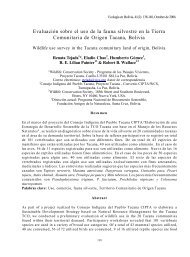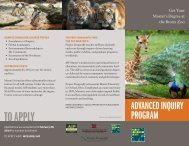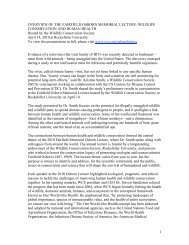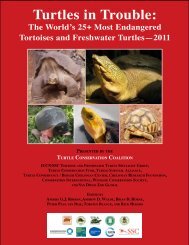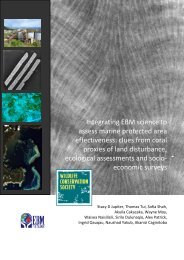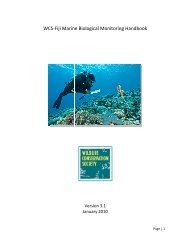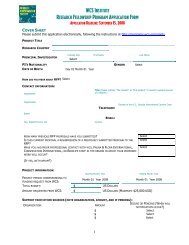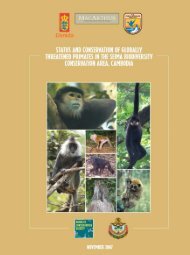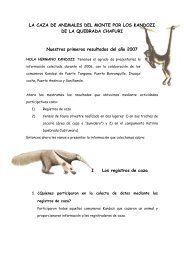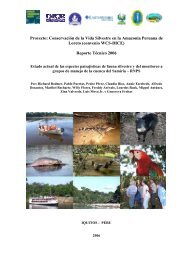WCS Annual Report 2012 - Wildlife Conservation Society
WCS Annual Report 2012 - Wildlife Conservation Society
WCS Annual Report 2012 - Wildlife Conservation Society
You also want an ePaper? Increase the reach of your titles
YUMPU automatically turns print PDFs into web optimized ePapers that Google loves.
[ below ] Camera traps<br />
like this one in Thailand<br />
help to monitor the status<br />
of individual tigers.<br />
Protecting Thailand’s Tigers<br />
Following the poaching deaths of at least nine<br />
tigers in Thailand’s Western Forest Complex in<br />
2010 and 2011, <strong>WCS</strong> helped to establish patrols<br />
that apprehended suspects in the killing of a<br />
tigress and her three cubs. One poacher’s cell<br />
phone contained a digital image of him posing<br />
on a dead tiger. The suspects argued that the<br />
animal was killed in neighboring Myanmar, but<br />
<strong>WCS</strong> camera trap photos proved otherwise.<br />
With wild tiger numbers down to 3,200 from<br />
more than 100,000 a century ago, the urgent<br />
need to protect these magnificent cats and their<br />
prey could not be greater. <strong>WCS</strong>’s long-running<br />
collaboration with the Government of Thailand<br />
to train and deploy park guards in the country’s<br />
most important reserve, the Huai Kha Khaeng<br />
<strong>Wildlife</strong> Sanctuary, has led to seven years of<br />
population stability in tigers and other wildlife,<br />
in contrast to dramatic declines in nearby<br />
unprotected parks.<br />
<strong>WCS</strong>’s long-running col laboration<br />
with the Government of Thailand<br />
to train and deploy park guards<br />
in the country’s most important<br />
reserve has led to seven years of<br />
population stability in tigers and<br />
other wildlife.<br />
The most effective protection involves the<br />
long-term efforts of committed park rangers<br />
patrolling protected areas with support for<br />
local communities. Though wildlife guards are<br />
typically deployed by national governments,<br />
outside support for technical training and<br />
financial resources is proving critical. Much of<br />
that comes from non-governmental organizations,<br />
with their generous private donors, and<br />
from national government agencies like USAID<br />
and the U.S. Fish and <strong>Wildlife</strong> Service.<br />
More money — and the resulting increase<br />
in the number of guards — is crucial to the<br />
survival of species targeted by poachers. Fortunately,<br />
relatively small investments can have<br />
big impacts. In Huai Kha Khaeng, nearly 200<br />
rangers cover an area of 1,073 square miles for<br />
an annual cost of under $5,000 per ranger. The<br />
results are encouraging: the cell phone-wielding<br />
poachers were convicted in <strong>2012</strong> to terms of<br />
four and five years – the harshest punishments<br />
for poaching in Thai history.<br />
Marking Independence Day in<br />
South Sudan<br />
<strong>WCS</strong> has been a conservation partner with<br />
South Sudan since the end of the two-decade<br />
long civil war with the north. Surveys conducted<br />
by <strong>WCS</strong> in 2007 revealed that globally<br />
unique wildlife and other natural resources had<br />
survived the war. With funding from USAID,<br />
<strong>WCS</strong> and the Government of South Sudan have<br />
been working since 2008 to sustainably manage<br />
natural resources, conserve biodiversity,<br />
improve security in remote areas, and reduce<br />
natural resource-based conflicts.<br />
On July 9, 2011, the people of South Sudan<br />
formally voted to become an independent<br />
nation. Yet in the year following the vote, the<br />
relative peace that accompanied the separation<br />
of South Sudan from its northern neighbor<br />
gave way to new ethnic conflict and clashes<br />
over disputed oil fields. While petroleum drives<br />
much of the conflict, the south remains home<br />
to other critical resources: vast un-fragmented<br />
ecosystems, immense water resources and intact<br />
woodlands; and the world’s second largest land<br />
mammal migration.<br />
<strong>WCS</strong> serves as the official technical partner<br />
of the Government of South Sudan for its<br />
protected area system. The establishment and<br />
stewardship of areas such as the Boma and Badingalo<br />
Parks, along with key wildlife migration<br />
corridors, has led to a dialogue over land and<br />
resource management and improved detection<br />
and deterrence of armed groups. Protected<br />
area employment opportunities are a stabilizing<br />
influence for young farmers and herdsmen<br />
susceptible to involvement in tribal unrest.


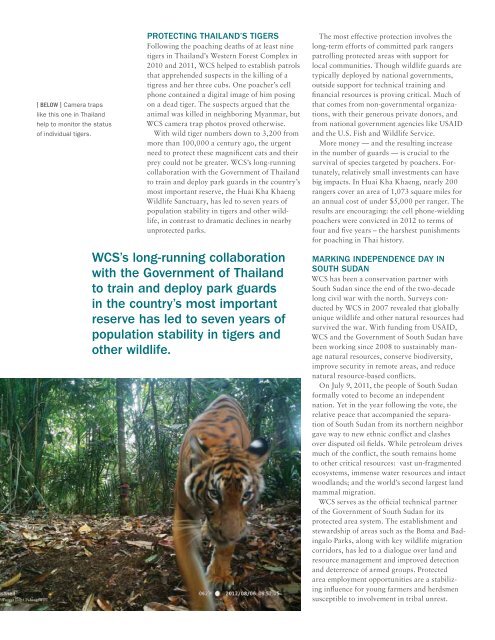
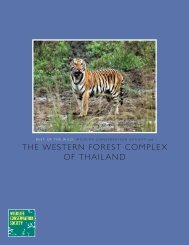
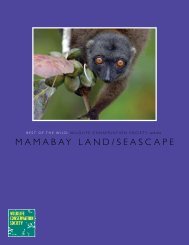
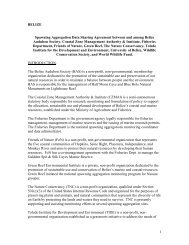
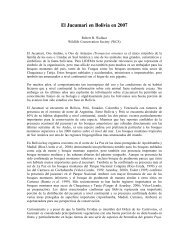
![RaLand / SeaScape [PDF] - Wildlife Conservation Society](https://img.yumpu.com/49974326/1/190x245/raland-seascape-pdf-wildlife-conservation-society.jpg?quality=85)
